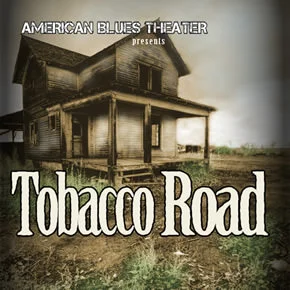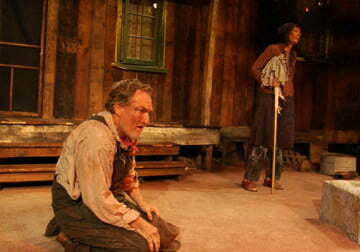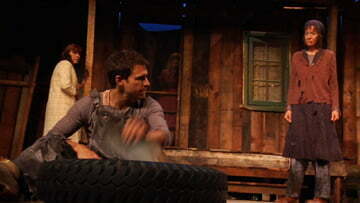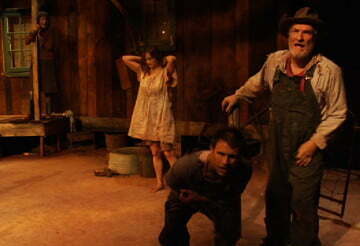Tobacco Road
By Jack Kirkland based on the novel by Erskine Caldwell
Directed by Cecile Keenan
Produced by American Blues Theater
At Victory Gardens’ Richard Christensen Theatre
Gritty realism aptly depicts the underbelly of rural Southern sharecroppers
Opening in 1933, Jack Kirkland’s Tobacco Road gave the Broadway audience a realistic look at the plight of rural sharecroppers who live in economic and moral poverty fueled by ignorance, incest and laziness. Tobacco Road played to 3,183 performances making it the second longest running drama in Broadway history. When Tobacco Road toured the nation, it was declared ‘obscene’ and barred in Chicago and Detroit among other cities. It took lawsuits to reopen the show.
American Blues Theater, under the tight direction by Cecilie Keenan, have resurrected all the gritty raw realism of Kirkland’s Tobacco Road. James Leaming’s set is a dilapidated shack in rural Georgia near the South Carolina border during the Great Depression. The Lester clan is a morally corrupt group of poverty stricken sharecroppers that find themselves without money, food or hope. The Lester’s give new depth to dysfunctional and desperate families. They are faced with starvation and eviction from the land they have farmed for generations. Not having planted or harvested a crop in seven years, amazingly Jeeter Lester (Dennis Cockrum) has no sense of urgency despite his acute hunger.
Rather Jeeter spends his time either ‘thinking’ or scheming to get food and money. His laziness overwhelms him despite the nagging by his wife Ada (Carmen Roman). Only 2 of their 17 children, remain including Dude (Matthew Brumlow), a simple-minded slothful teen who spends his time bouncing a hardball against their shack.
Besides acquiring enough food to survive, patriarch Jeeter’s goal in life is to stay on his land until his death. He wishes to be buried deep enough when he dies that the rats won’t eat his face. His wife, Ada, want to be buried in a new fancy dress. The Lester’s never heard of soap to wash either their clothes or themselves.
Filled with explosive sexuality, Tobacco Road vividly depicts the raw ignorance of rural poor folks. The action of Tobacco Road involves the struggles the Lesters’ have to keep their farm, feed the starving family and arrange suitable marriages for his 2 remaining children. Ellie may (Gwendolyn Whiteside) the deformed woman, is undesirable as a wife. We see how viciously the Lester’s’ treat Grandma Lester (Suzanne Petri) as they verbally insult her due to her feeble-mindedness. The Lester’s have no money, no seeds, and no foreseeable way out.
Most of the play depicts, with doses of sick humor, the brutally honest truths of the quest to survive in a world of self-imposed poverty. We are sickened by the lack of morality in this clan, no genuine feeling for anyone, no sense of family bonding, no love, no sincere religious beliefs. Sexual needs are taken care of like animals in heat.
Tobacco Road is an emotionally shocking, outrageous and horrifying drama. What scares us most is the fact that in 2010 we still have pockets of poor, ignorant uneducated folks similar to the Lester’s of the 1930’s. Basic survival at any cost is still experienced in both rural and urban settings.
American Blues Theater’s expert cast is led by the steady work by Dennis Cockrum as Jeeter. Carmen Roman (Ada) and Matthew Brumlow (Dude) offer wrenching performances. The ensemble work here was terrific, the pace was effective, and the direction was tight. Tobacco Road will remind you that ignorance is still rampant in rural America. Tobacco Road is powerful, earthy theatre.
Highly Recommended
Tom Williams
At the Victory Gardens Richard Christiansen Theatre, 2433 N. Lincoln Ave., Chicago, IL, call 773-871-3000, www.americanbluestheater.com, tickets $32 – $40, Thursdays at 8 pm, Fridays at 7;30 pm, Saturdays at 3 & 7:30pm, Sundays at 2:30 pm, running time is 2 hours with intermission.




